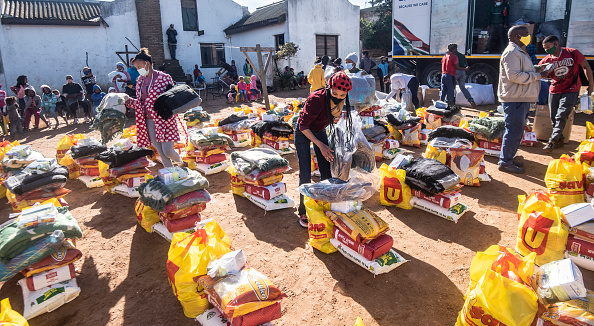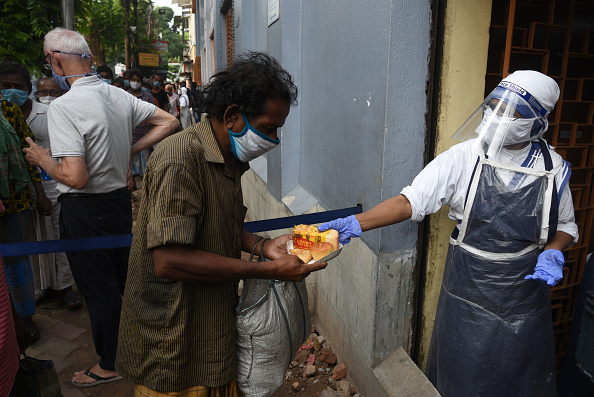
Gift of the Givers donate food hampers, blankets, anti-virus and baby care packs to 115 families at Mesco Farm in Stellenbosch, South Africa, July 7, 2021. /Getty
Gift of the Givers donate food hampers, blankets, anti-virus and baby care packs to 115 families at Mesco Farm in Stellenbosch, South Africa, July 7, 2021. /Getty
Editor's note: Stephen Ndegwa is a Nairobi-based communication expert, lecturer-scholar at the United States International University-Africa, author and international affairs columnist. The article reflects the author's opinions and not necessarily the views of CGTN.
While the truism that the poor will always be among us seems to have been universally accepted, there is an emerging school of thought that equates poverty with social and economic injustices that can and should be overcome.
Having witnessed China's single-minded determination, it is time for the international community to dedicate itself more to eradicating poverty. There must be a missing link in the current poverty eradication programs as espoused by many of the world's international bodies as poverty seems to be increasing rather than decreasing within countries.
Using its definition of extreme poverty as living on less than $1.90 a day, the World Bank in October warned that global extreme poverty rose in 2020 for the first time in more than 20 years due to the compounding effects of the COVID-19 pandemic on conflict and climate change. Besides, the bank in 2020 estimated that the pandemic would push between 88 and 115 million more people into extreme poverty in the year, with the figure hitting 150 million by 2021.
It is a case of the poor becoming poorer as the pandemic has worsened their access to essential services and damaged their livelihoods, a situation that has pushed them further to the bottom of the socioeconomic strata.
These issues were highlighted during the United Nations International Day for the Eradication of Poverty 2021 on October 17 under the extended theme, "Building Forward Together: Ending Persistent Poverty, Respecting all People and our Planet." But beyond having money in the bank, the poor are seeking more involvement in finding solutions that are relevant and practical to their endemic challenges.
Due to the ineffectiveness of the top-down economic models, there is a growing drive towards a bottom-up approach in economic empowerment which gives the poor a fair share of the decision-making process and a voice in addressing their concerns. For long, the technocratic policy makers have underrated or totally ignored ideas from the poor due to the perception that they do not have ideological or intellectual competence.
It is said that poverty exists not because we cannot feed the poor, but because we cannot satisfy the rich. This observation resonates with the late Indian lawyer and humanitarian Mahatma Gandhi, who believed that "the world has enough for everyone's needs, but not everyone's greed."

Members of The Missionaries of Charity distribute food to underprivileged people in Kolkata, India, August 26, 2021. /Getty
Members of The Missionaries of Charity distribute food to underprivileged people in Kolkata, India, August 26, 2021. /Getty
The current inequalities between the rich and the poor, at both national and international levels, are no longer sustainable, even acceptable. The world's richest 1 percent hoard more than twice as much wealth as 6.9 billion people. Every year, 100 million people are pushed into extreme poverty due to healthcare costs. Ironically, the wealth of these billionaires is made from the brow of the majority of poor who often work for slave wages.
But closing these gaps should not be misconstrued with begrudging the rich or wealthy people's due rewards for their toil and entrepreneurship. We need a system that leaves no one behind by expanding the reward system for every type of effort. The rich should also feel obliged to pay more so that their earnings can have added social value and help to narrow the glaring socioeconomic disparities.
There is a call for a paradigm shift in the way the world shares its resources by adopting new business models, which the World Bank notes as "capital, labor, skills and innovation" to move into a new, post-COVID business environment. This approach would be a boon for millions of unemployed but talented or qualified youth who currently lack productive engagement.
There is really no magic bullet. The "secrets" of success are contained in the white paper "China's Epic Journey from Poverty to Prosperity," released on September 28, which documents the country's holistic approach to eradication of extreme poverty that included all-round development, prosperity for all and hard work.
In achieving a moderately prosperous society, China also dramatically reduced the world's poverty-stricken population. Since China launched reform and opening up, 770 million rural Chinese have crossed the country's poverty line and moved out of extreme poverty. According to the World Bank's poverty line, poverty reduction in China represents 70 percent of the global total, achieving the target set by the UN 2030 Agenda for Sustainable Development 10 years ahead of schedule.
Ultimately, as China has demonstrated through the leadership of the Communist Party of China, eradicating poverty needs massive political goodwill. It starts with leaders deciding that inequality is not a defining factor of humanity. We need an economy that works for everyone at whatever level they plug into the prevailing system.
(If you want to contribute and have specific expertise, please contact us at opinions@cgtn.com.)

